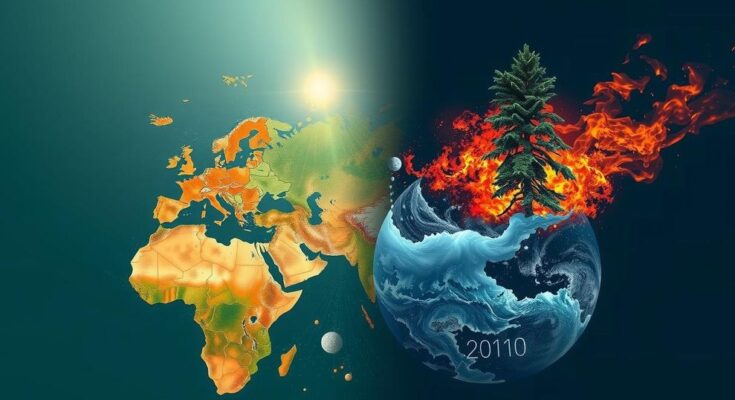The article asserts that Armageddon signifies not only war but also the existential threat posed by global warming. It discusses the theological imperatives for stewardship in Judaism and Islam alongside the scientific realities of climate change. The text urges collective human action, highlighting that transformative societal changes may arise from the ongoing environmental crisis. The conclusion emphasizes hope for a Messianic Age defined by peace and cooperation in addressing ecological challenges.
The term “Armageddon” is often associated with catastrophic events, but its true implications extend beyond warfare to encompass the pressing issue of global warming. Although the word appears only once in the Greek New Testament, its depiction in Revelation highlights the urgent spiritual call for collective human accountability concerning our environmental stewardship. Both Judaism and Islam emphasize the necessity of caring for the earth, urging believers to acknowledge their role as guardians of the planet and assume responsibility for its preservation. As Europe becomes the fastest-warming continent, predictions indicate severe consequences from just half a degree Celsius of additional warming, including the destabilization of ice sheets and rising sea levels, which threaten millions across the globe.
Studies reflect that over 90% of the world’s population faces amplified risks from extreme weather and climate change, exacerbating social inequalities and undermining nature’s ability to absorb CO2 emissions. The continuing rise in global temperatures, coupled with a record surge in carbon emissions in 2022, underscores the urgency of addressing climate issues. By 2100, research indicates that nearly all marine life could be at risk of extinction if emissions are not curtailed. Wildfires in regions like Sierra Nevada and the Southern Cascade forests exemplify the immediate impacts of climate change, signaling a pressing need for action.
Religious narratives surrounding the Messianic era in Judaism, Christianity, and Islam align with the need for transformation in human society amid these environmental crises. Many believe that human unresponsiveness to climate change could delay the arrival of Messianic figures who may aid in the journey toward global peace. Jewish tradition teaches that the transition to the Messianic Age involves human participation and adheres to moral principles, which are integral in facilitating a new world order defined by justice and harmony.
In exploring the eschatological dimensions, these traditions envision the end of current societal frameworks as a precursor to the Messianic Age—a time characterized by peace and cooperation among nations. The scriptural narratives highlight that transformative redemption does not imply an end but a profound shift toward equitable existence among humanity. As such, the continued deterioration of our environment may either catalyze chaos or precipitate the foundational changes necessary for rebirth into a sustainable and just world.
The article delves into the multifaceted implications of Armageddon, not solely as a harbinger of war but as a lens through which to examine the consequences of global warming. By linking scriptural references to modern ecological crises, it advocates for a collective moral responsibility found in both Judaism and Islam. The session of global temperatures and their historic peaks serve as a backdrop for the urgent call to action against environmental degradation, urging religious communities to unify for the stewardship of the earth. Through this framework, the piece articulates a vision of hope interspersed with the realities of climate change, advocating for a cooperative approach to both social justice and ecological sustainability.
In conclusion, the interpretation of Armageddon transcends the concept of warfare and encompasses the urgent environmental crisis posed by global warming. Both religious teachings and scientific research underscore the necessity for human stewardship of the planet. As communities of faith contemplate their role during this transformative period, they are encouraged to embrace collaborative efforts toward environmental preservation. Ultimately, positive action aligned with moral principles may pave the way for the long-awaited Messianic Age characterized by justice, equity, and global harmony.
Original Source: www.eurasiareview.com




